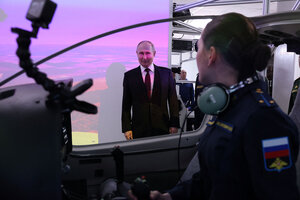Europe divided over how far to push Putin

Russian President Vladimir Putin visits a pilot training school. He has threatened grave consequences if Ukraine uses advanced German cruise missiles against Russian targets.
Sputnik/Mikhail Metzel/Reuters
London
Vladimir Putin is facing a critical referendum on his war in Ukraine. And it is unclear whether he will get the result he has been trying to engineer.
That’s because the “voters” in this contest aren’t the millions of Russians poised to hand him a further six years in the Kremlin at next weekend’s presidential election; anti-war candidates have been barred from running.
This audience is tougher and, for Mr. Putin’s war, more consequential: the leaders of Western Europe.
Why We Wrote This
Vladimir Putin will win the upcoming Russian elections. But who will win the argument in Europe over just how assertively to defend Ukraine and guard against future Russian aggression?
Over the past 10 days, they’ve been locked in an intensifying debate over whether, and how, to ratchet up military support for Ukraine – even if that means ignoring Mr. Putin’s warnings of a wider conflict.
And as Ukraine’s key ally, U.S. President Joe Biden, finds it ever harder to win bipartisan backing for aid to Kyiv, the European debate could prove decisive in the war.
The immediate issue is arms, like the artillery shells Kyiv desperately needs and longer-range missiles capable of hitting targets far from the front lines. That includes the Kerch Bridge, the multibillion-dollar span between Russia and Crimea that Mr. Putin inaugurated after seizing the peninsula from Ukraine in 2014.
At the core of the debate, however, are deeper strategic questions: How important for Western Europe’s future is the Ukraine war? And if, as some European leaders fear, a Russian victory would embolden Mr. Putin to threaten other neighbors, how might they deter him?
Through diplomacy? Firm warnings, calibrated arms deliveries to Ukraine staving off major Russian gains, and a reliance on a mutual interest with Mr. Putin to avert a head-on conflict?
Or a more assertive response? That would mean both arming Ukraine better and stepping up Europe’s own military preparedness, expenditures, and arms production to build a long-term bulwark against potential Russian attack.
The debate has been bubbling for months, as countries nearest to Russia – such as Poland and the former Soviet Baltic republics of Estonia, Latvia, and Lithuania – have tried to nudge other European leaders toward the more assertive Option 2.
This week, the debate erupted into a public tug of war between Europe’s leading political players, Germany and France.
Germany favors the more cautious approach.
It’s not that Chancellor Olaf Scholz wants Russia to prevail. Within days of Mr. Putin’s invasion, he called it a Zeitenwende – a turning point – for Germany and committed to meeting NATO’s target of spending at least 2% of gross domestic on the military.
Germany has been the second-largest provider of military aid to Ukraine, behind only the United States.
Yet Mr. Scholz has repeatedly delayed sending key weaponry – first battle tanks and now Europe’s longest-range missile, the German Taurus.
His concern is to avoid anything that might draw Germany into direct conflict with Russia.
That’s partly for historic and political reasons: the legacy of two world wars in which Germany battled Russia, and a distinct lack of popular support, especially in the former East Germany, for deeper Ukraine involvement.
Mr. Scholz has been withholding the Taurus despite pressure not just from other Europeans, but also from some other German politicians.
That’s where France has now entered the fray.
President Emmanuel Macron has made no secret of his frustration over Germany’s reluctance to deliver a missile that no other European country can provide.
But his aim in convening a Paris summit on Ukraine late last month was wider: to make the case for Option 2, a more assertive, longer-term recalibration of Europe’s security policy in response to Russia’s aggression.
Germany was quick to point out that Mr. Macron seemed an unlikely standard-bearer.
Early in the war, he continued to talk to Mr. Putin, hoping to negotiate an end to the fighting. He urged Western leaders not to “humiliate” Russia, arguing that this would make a diplomatic exit harder.
And France’s military assistance to Ukraine has been but a small fraction of Germany’s.
Yet Mr. Macron’s view of the war, and of the longer-term security threat that he fears Mr. Putin represents, has been steadily hardening.
After the summit, he said Russia “has its eyes not just on Ukraine, but other countries as well.” For the first time, he insisted that Europe’s interests required more than preventing Mr. Putin from winning. An outright Russian defeat, he said, was “indispensable for stability and security in Europe.”
This debate – not to mention the kind of major European security overhaul Mr. Macron wants – will take many months to play out, and Mr. Putin is clearly watching.
Listening, too. This week, the Kremlin-backed overseas network RT released a leaked tape of supposedly private discussions among senior German military officers about how they might convince Mr. Scholz to approve the provision of Taurus – complete with references to its ability to take out the Kerch Bridge.
Russian officials promptly played up the potential threat, and the wider repercussions, if that happened. And for now, the leak and Moscow’s response may well harden Mr. Scholz’s view.
Still, Mr. Macron’s longer-term argument resonates strongly in other European countries, especially those closest to Russia. It is unlikely to go away.
And while Mr. Putin will have no doubts about the outcome of Russia’s upcoming presidential election, when it comes to Europe’s Ukraine debate, he can be far less certain.

